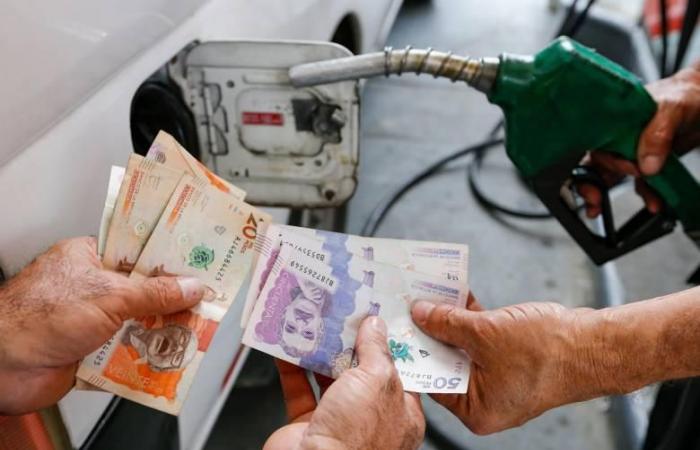
07:24 AM
Around noon on Monday, June 24, the Ministry of Finance made public the decree with which The price per gallon of Acpm will increase in Colombia for large consumers, that is, those who demand more than 20,000 gallons per month.
The Minister of Finance, Ricardo Bonilla, specified that Decree 763, which regulates the price of diesel for large consumers such as oil, mining and cement companies, It does not apply to service stations or retail distributors. “It comes into force at the beginning of August and begins to float with the international market”.
This decree introduces a differential price stabilization mechanism for Regular Motor Gasoline (GMC) and Motor Fuel Oil (Acpm). It also adds an article to the Single Regulatory Decree of the Finance and Public Credit Sector.
According to the new article, The income to the producer for these large consumers must be, at least, the international parity price.
Given these changes, Arnulfo Cuervo, vice president of Fedetranscarga, reiterated that the new value that will be implemented for this fuel will be the international parity price, but He questioned that this measure has not taken into account the gradualness when the price of gasoline was increased.
“Large consumers will ultimately affect the economy of all Colombian households, for example, cement producers will increase the value of their products“This will even continue to harm the minimal development that the construction industry in the country has been experiencing,” Cuervo warned.
It must be remembered that Minister Bonilla specified: “This allows us a savings of $50 billion monthly, that is, $600 billion a year. Large consumers represent 5% of total Acpm consumption and houses around 150 companies that focus on mining, oil (60%), among others.”
The minister indicated in his presentation thatThis rise in diesel will only impact the country’s inflation by 1.4 points in the remainder of 2024. “If we have cash problems, if we already have some problems, we have to think about some painful measures of how we adjust the deficit, no one likes that.”
Regarding these adjustments, Cuervo revealed that They asked the Government to exclude the activity of the cargo transportation sector when implementing this type of increases.“since national supply must be guaranteed, and cargo transportation is the main means by which products and food have been transported in the country.”
The inter-union Committee of Valle del Cauca joined the objections, which through a statement expressed its concern about the decree of the Ministry of Finance that increases the price of Acpm for large consumers, aligning costs with fluctuations in the international market.
“Therefore, Making a differentiation in the cost of one of their main inputs is inequitable and puts them in a situation of unequal competition compared to companies that provide the same service.discouraging formalization and business growth,” detailed the union of unions of this region.
According to the statement, The increase in the price of Acpm, which represents 40% of the operating costs of transport companies, has the potential to accelerate inflation and hinder the efforts of the Bank of the Republic to reduce interest rates, crucial for economic recovery.
“Besides, This increase coincides with planned increases in toll rates, intensifying the impact on transportation costs. and, therefore, in the prices of goods and services, directly affecting consumers and the economy in general,” the committee warned.
You may be interested in: Details of why negotiations to increase the price of Acpm are on hold
This measure comes at a challenging time, marked by road blockages, insecurity and low cargo volume, and poses serious challenges for the country’s business and transportation sector.
“We call on the National Government to reconsider this measure and explore alternatives that do not further aggravate the situation of the transported sector.r, essential for the economic dynamics of the country,” concluded the Inter-Union Committee.
Reasons for the rise
This increase is due to the deficit that persists in Colombia due to the subsidy from the Fuel Price Stabilization Fund (Fepc), especially with diesel, which has remained stable since the pandemic.
“Since January 2020, and even before the pandemic, fuel prices were frozen, That means that for four years and five months, the price of diesel has not been touched,” Bonilla said.
In that order, the shortfall to close said deficit is diesel, “which is a little more complicated,” since gasoline was already closed in the first three months of 2024.
According to MinHacienda, The deficit in 2023 was $15.2 billion and with what is being done this year it would close at $12 billion.
Sergio Cabrales, professor at the University of Los Andes and expert in energy and hydrocarbons, stated that, in Colombia, The price of diesel must rise around $3,900 per gallon to prevent the Fuel Stabilization Fund (Fepc) from continuing to subsidize it, as proposed by the Minister of Finance. “This represents an increase of about 40% compared to the current price per gallon of diesel.”
You may be interested in: Transporters ask the Government to continue with the dialogues to specify the price of the ACPM
In this sense, Julio César Vera, president of the Xua Energy Foundation, agreed that Any measure taken to reduce or eliminate the diesel subsidy, from an energy, social, economic and fiscal point of view, is correct.
According to his accounts, It is a measure that impacts approximately 12% of the country’s diesel demand, which is around 145,000 barrels per day (a little more than 6 million gallons per day), that is, about 17,400 thousand barrels per day on average (731,000 galleons per day).
“The measure does not apply to gasoline pumps or retail distributors. These large consumers buy directly from the wholesale distributor. What is sought is to put the price of diesel, for these consumers, to float with the international market“said Finance Minister Ricardo Bonilla.
You may be interested: Price of diesel in Colombia would rise between $2,000 and $3,000, warns Ricardo Roa, president of Ecopetrol





